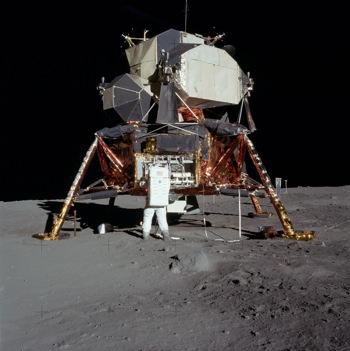Today is July 20th and it signifies a very important day in the history of mankind. It is the day we celebrate the 40th anniversary of the moon landing and, in many ways, the culmination of the advent of the technology age. 40 years ago today, we began a journey into space that has not receded (though we have not recently returned to the surface of the moon).
Much is being made of this anniversary today. WeChooseTheMoon.org, a fascinating real time re-enactment of the mission, including the days leading up to the pivotal moment, is a project of the John F. Kennedy Presidential Library.
It was Kennedy, in an address to a joint session of Congress in 1961, that called on Americans, with a specific mandate to NASA, to put a man on the moon by the end of that decade. An excerpt of this speech:
Finally, if we are to win the battle that is now going on around the world between freedom and tyranny, the dramatic achievements in space which occurred in recent weeks should have made clear to us all, as did the Sputnik in 1957, the impact of this adventure on the minds of men everywhere, who are attempting to make a determination of which road they should take. Since early in my term, our efforts in space have been under review. With the advice of the Vice President, who is Chairman of the National Space Council, we have examined where we are strong and where we are not, where we may succeed and where we may not. Now it is time to take longer strides–time for a great new American enterprise–time for this nation to take a clearly leading role in space achievement, which in many ways may hold the key to our future on earth.
I believe we possess all the resources and talents necessary. But the facts of the matter are that we have never made the national decisions or marshalled the national resources required for such leadership. We have never specified long-range goals on an urgent time schedule, or managed our resources and our time so as to insure their fulfillment.
<snip>
I believe that this nation should commit itself to achieving the goal, before this decade is out, of landing a man on the moon and returning him safely to the earth. No single space project in this period will be more impressive to mankind, or more important for the long-range exploration of space; and none will be so difficult or expensive to accomplish. We propose to accelerate the development of the appropriate lunar space craft. We propose to develop alternate liquid and solid fuel boosters, much larger than any now being developed, until certain which is superior. We propose additional funds for other engine development and for unmanned explorations–explorations which are particularly important for one purpose which this nation will never overlook: the survival of the man who first makes this daring flight. But in a very real sense, it will not be one man going to the moon–if we make this judgment affirmatively, it will be an entire nation. For all of us must work to put him there.

Since then, the United States and the world have gone through vast technological breakthroughs, often in greater haste than the 8 years it took to put a man on the moon. For instance, consumer electronics continue to progress at a staggering speed, particularly with the advent of the iPhone.
The internet burgeoned from a 5 hours monthly dial-up plan with AOL to saturation of broadband in many areas of the world.
Companies like Google continue to harness computing power to create vast databases of information.
Currently, NASA has the Lunar Reconnaisance Orbiter (LRO) circling the moon in advance of a new moon mission by the end of 2020. The LRO is trying to map the entire moon surface (including the notoriously unknown “dark side of the moon”) to determine resources and terrain for the construction of a manned lunar outpost.
Many companies, news sources and blogs (including this one), are commemorating the moon landing with special logos, graphics or other site modifications. It’s just our way of saying “Wow”.
